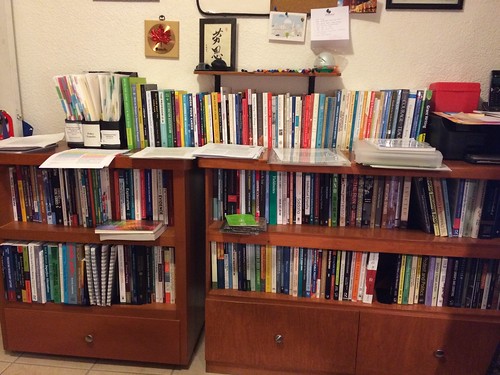In a previous post, I indicated that one of the best ways to develop a writing practice was to read volumes that worked as workbooks, teaching readers how to write and how to gradually learn the craft of producing good prose. This post is a summary of the second part of my Twitter thread on writing practices, wherein I offer 12 pieces of advice to help current and writers-to-be hone their craft.
Now, on to the list…
4) Routine helps develop a writing practice (even if you write only one day a week, make it part of your system)https://t.co/55mjMCBr5v
— Dr Raul Pacheco-Vega (@raulpacheco) September 6, 2020
7) Adapt other’s writing strategies, recommendation and practices as you develop your own. Learn from what others are doing. https://t.co/a9YAX1qFLP
8) Small writing goals help build confidence AND a writing practice https://t.co/vbHefr5nAK
— Dr Raul Pacheco-Vega (@raulpacheco) September 6, 2020
10) Reading IS writing. You can’t develop a writing practice without developing a READING practice first. https://t.co/lQSxjOEV5G
11) Being structured MAY help you strengthen your writing practice. https://t.co/zszfikTn6V
— Dr Raul Pacheco-Vega (@raulpacheco) September 6, 2020
And the last tip on the list, but by no means the least important.
12) You may feel like you spend more time “on the runway” or “doing grunt work” than “actually writing”. Time investments in each of these categories (grunt work, runway and writing) is important to develop a writing practice. https://t.co/IU6ajEi8Ls
</END THREAD>
— Dr Raul Pacheco-Vega (@raulpacheco) September 6, 2020
We all know how important reading is for me (so much so that I launch Reading Challenges and have a full page filled with links to blog posts I’ve written on Reading Strategies). At the same time, I am always pushing for scholars and other writers to recognise that we ought to value the runway time we invest, and do the grunt work too.
Hopefully these 12 tips will help those of you interested in starting or perfecting your writing practice.


How not to get emotional about your writing? I mean how not to “hate” your writing? Every time I have some writing to perform, I am really unwell, my mind goes blank and don t know what to write(no it is not literature writing, it s mathematics). You have to analyze and comment your formulae. I hate that, i ve chosen maths because i thought had no comments, no blablabla to put, but when you are in applied maths, you have to explain more, and that is what i am bad, and it gets worse along the time. I love reading, long texts, novels, i ve read a huge number of books, articles, blog posts most of them about how to improve my writing. But i think i m even worse after that. I think I have to be a “writer” to come up with good writings. It s frustrating, for it is not a matter of vocabulary or grammar, i am better than anyone around me, they call me english dictionary(english is my third language). But still, i cannot come up with a “publishable” 10-15-pages paper written in english( or in french). Still my writing is bad no matter what effort i put in to write it. This comment speaks for itself.
Thank you professor.
For a someone who hates writing, I ve written a long comment. Unfortunately, it is not the case for writing research. Actually what I hate about writing research is rewriting (reporting) the existing results (not only the literature review). I am very uncomfortable about “property”. I want to be absolutely sure that over 50 percent of what I write is mine and only mine.
Otherwise it is not really interesting. I know I seek the impossible, difficult to get rid of limiting beliefs.